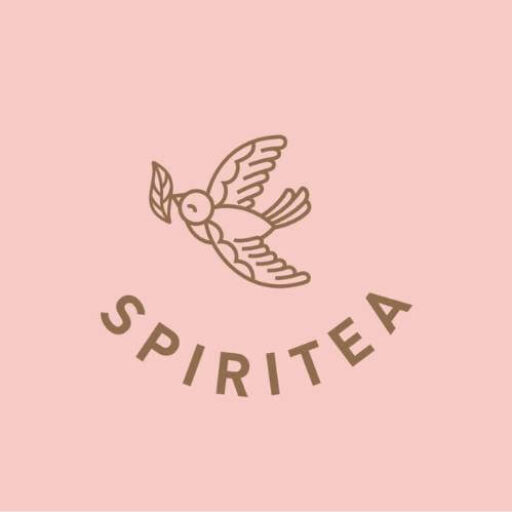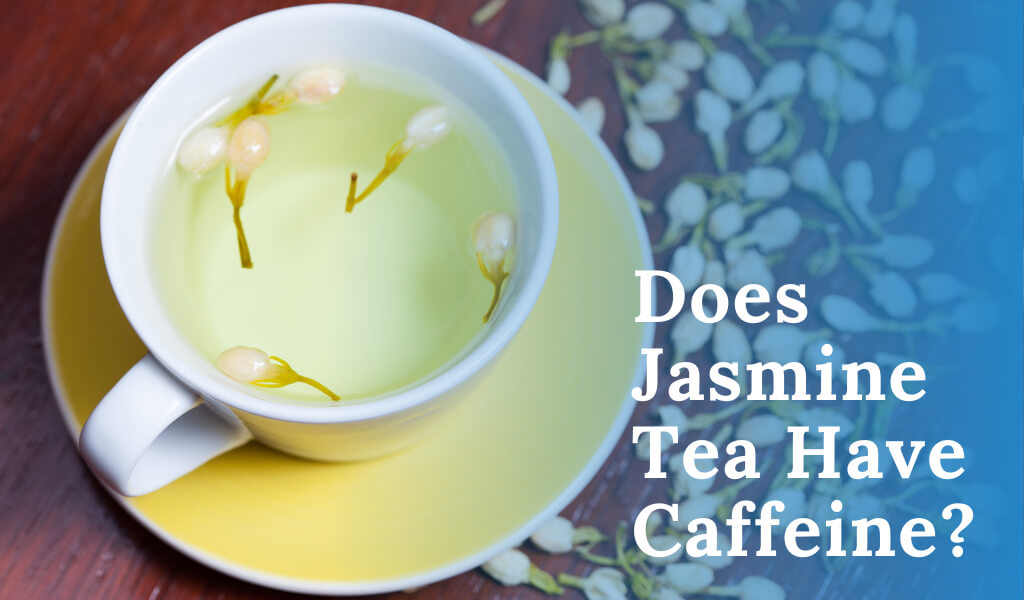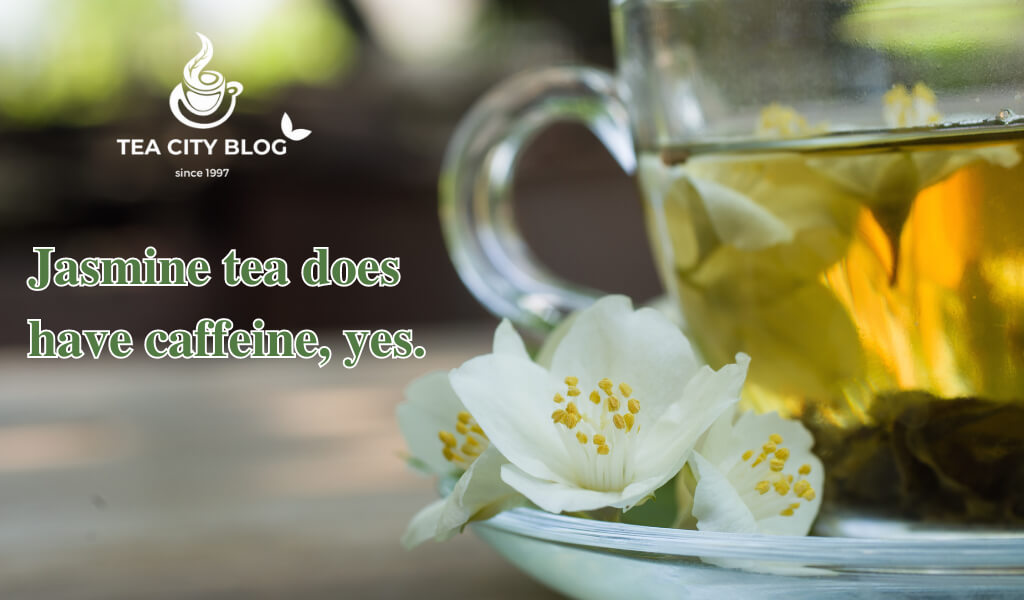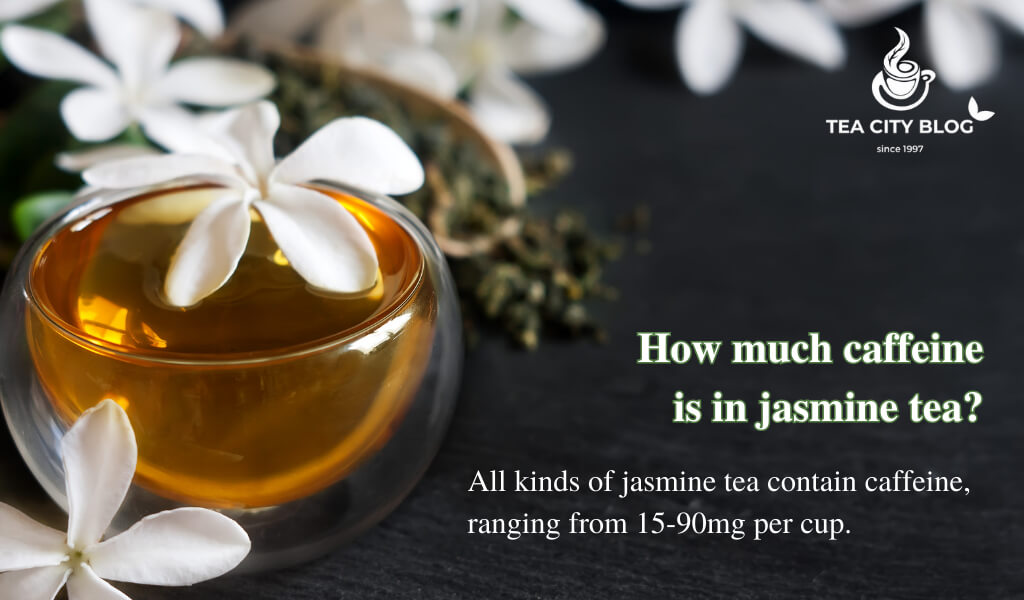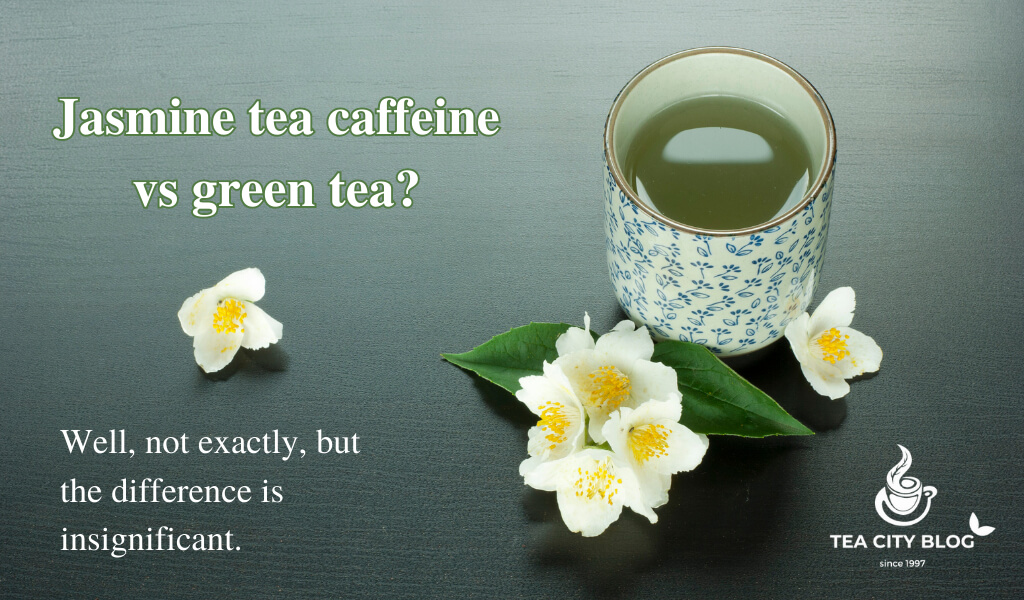Does Jasmine tea have caffeine?
Yes. Like other green tea blends, Jasmine tea is a naturally low-caffeine beverage. Each cup contains about 25mg of caffeine. That is half the amount in a cup of black tea, equivalent to a cup of green tea, and 75% less than a cup of coffee.
The amount of caffeine in jasmine tea varies depending on the type of tea and how it’s brewed. Additionally, how you steep your tea leaves can significantly impact the final caffeine content and the ultimate benefits of jasmine tea.
A quick steep yields less caffeine compared to a longer one. So, steep wisely! After a caffeine boost, reach for teas made from younger leaves and tips like Downy Jasmine Needle tea. But, looking for something unique? Try Purple Jasmine, one of the best jasmine green tea with the rare blend. It’s not as caffeinated as regular green tea but has higher antioxidants.
Pure jasmine tea is your best bet if you’re looking for a low-caffeine option. However, if you enjoy the taste and aroma of jasmine tea blends, options are available with less caffeine. For instance, herbal teas are caffeine-free and can be used as a base for jasmine tea blends.
Quotes of tea at Today
“There is no problem on earth that can’t be ameliorated by a hot bath and a cup of tea.” – Jasper Fforde
How much caffeine in jasmine tea?
In fact, Jasmine tea can have varying amounts of caffeine depending on the type of tea used and how long it’s steeped. Generally, all kinds of jasmine tea contain caffeine, ranging from 15-90mg per cup.
The usual green tea base in jasmine tea gives it a gentle, herbal taste and contains an average of 25-50mg caffeine for an 8-oz cup. White tea, being less caffeinated than green tea, has a slightly lower caffeine content. Oolong tea, on the other hand, has a slightly higher caffeine content than green tea.
Jasmine tea made with a black tea base has the highest caffeine content for those who prefer more potent tea. Typically, a cup of jasmine tea made with black tea contains 45-70mg of caffeine. However, the caffeine content can vary based on how long the tea is steeped and the ratio of black tea leaves to jasmine.
Jasmine tea caffeine vs green tea
Jasmine green tea caffeine is often made using green tea as a base, which may make you wonder if they have the same caffeine content. Well, not exactly, but the difference is insignificant. Green tea and jasmine tea blends with a green tea base have similar caffeine content with only minor differences. Keep this in mind.
However, jasmine tea’s more pungent floral taste means people may use fewer tea leaves for each cup, resulting in less caffeine. In other words, how jasmine tea (how does jasmine tea taste) taste depends on the caffeine content inside.
Moreover, since jasmine tea has a potent flavour, it can be steeped shorter than green tea, which requires soaking time. Therefore, the caffeine content depends on the caffeine levels in different blends and the preparation.
Read More:
Caffeine Content In Jasmine Tea Vs. Other Beverages
If you’re mindful of your caffeine intake, comparing jasmine tea with other drinks might be helpful when deciding what to sip in the morning or afternoon. This way, you can make an informed choice that’s right for you.
| Beverage | Caffeine Content (mg) |
| Jasmine Tea | 25-50 (varies with base) |
| Green Tea (base for jasmine) | 20-50 |
| Black Tea (base for jasmine) | 45-70 |
| White Tea (base for jasmine) | 15-39 |
| Oolong Tea (base for jasmine) | 15-60 |
| Regular Brewed Coffee (8oz.) | 95 |
| Instant Coffee | 60 |
| Espresso (single) | 60-65 |
| Espresso (double) | 130 |
| Venti Blonde Roast (20oz.) | 475 |
| Regular Coke (12oz.) | 34 |
| Diet Coke (12oz.) | 46 |
| Pepsi One | 57.1 |
| Red Bull | 80 |
| Rockstar/Monster (16fl. oz.) | 160 |
Other Teas
Jasmine tea brewed with green, black, or white tea as a base has caffeine levels comparable to regular tea prepared the same way without jasmine.
- Green tea contains approximately 20-50mg
- Black tea has 45mg-70mg
- White tea has 15-39mg
- and oolong tea has 15-60mg.
Remember! when brewing jasmine tea, its floral taste may allow for a shorter steeping time or a smaller amount of tea leaves per cup. The floral notes are more pronounced, and fewer tea leaves will lower caffeine content.
Coffee
Thanks to jasmine green tea caffeine content, coffee is known for its ability to give us an energy boost. Compared to jasmine tea, coffee is usually much more robust.
For example, an average 8oz. A Cup of brewed coffee has around 95mg of caffeine, while instant coffee has slightly less at approximately 60mg. In contrast, the average cup of jasmine tea contains only 25-50mg of caffeine.
If you order a coffee in a café or drink espresso, the caffeine content can be even higher. A single espresso has about 60-65mg of caffeine (a double-shot of around 130mg – that’s a strong kick!). But it can be even higher than that!
For instance, a venti-sized cup (20oz) of Blonde Roast black coffee can have a whopping 475mg of caffeine – enough to keep anyone up all night!
Soft Drinks
If you’re curious about how much caffeine you consume, it’s essential to know that it can be found in soft drinks and sodas as a flavoring and energy booster. To compare with jasmine tea, known for its caffeine content, let’s look at some popular soda brands.
A 12oz regular Coke has 34mg of caffeine, while Diet Coke has even more at 46mg. These amounts are similar to the average range of 25-50mg in jasmine tea. It’s important to note that different sodas have different caffeine levels. The highest is Pepsi One, with 57.1mg of caffeine per serving.
Energy Drinks
Energy drinks are a popular choice for a pick-me-up during the day. Unsurprisingly, they contain a lot of caffeine, which can give you energy.
Red Bull, the most well-known energy drink, has about 80mg of caffeine per can. While this is slightly less than a cup of coffee, it’s still much more than the 20-50mg in a cup of jasmine tea.
Some energy drinks have even more caffeine than Red Bull, often in large cans. For instance, both Rockstar and Monster have 16fl. Oz.
Cans with a whopping 160mg of caffeine each. Don’t forget: energy drinks aren’t just loaded with caffeine. They are also high in sugar and may contain taurine, an amino acid that may benefit your brain and brain.
If you’re looking for a healthier choice, jasmine tea is undoubtedly a better option.
Is jasmine tea good for sleep?
Yes, jasmine tea can help you sleep better.
According to research, drinking jasmine tea before bedtime can reduce stress and improve sleep quality by fostering serenity and relaxation.
The Bottom Line
I highly recommend trying jasmine tea as it offers a unique and delightful taste compared to regular black or green tea.
The tea’s floral scent and distinct flavor make it a fantastic choice for a refreshing drink. However, the caffeine content in jasmine tea varies depending on the tea base used and the duration of the brewing process.
Drinking one or two cups of jasmine tea per day, especially if it’s certified organic, can provide significant health benefits for yourself.
When combined with green tea, jasmine tea has powerful antioxidants that can fight against Alzheimer’s, dementia, and heart disease, as well as helping in weight reduction.
It’s worth noting that overconsumption of jasmine tea, like any caffeinated drink, can cause headaches, restlessness, jitters, and anxiety. This can be especially problematic for individuals who are sensitive to caffeine.
However, jasmine tea could be an excellent option if you’re looking for a less intense alternative to coffee or energy drinks and find herbal teas or decaf coffee needs to be stronger.
I’m Shanna, creator of Spiritea Drinks. I’m all about teaching people to grow their own food, tea, cook what they harvest, and eat with the seasons.
